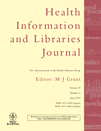
Health Information and Libraries Journal
Scope & Guideline
Advancing health informatics through innovative research.
Introduction
Aims and Scopes
- Health Information Literacy:
Focuses on the development and assessment of health literacy initiatives, aiming to improve public understanding and utilization of health information. - Technological Integration in Health Libraries:
Explores the impact of emerging technologies on health library services, including the use of artificial intelligence, big data, and digital health interventions. - Community Health Needs Assessment:
Addresses the unique health information needs of various communities, with a focus on culturally diverse populations and underserved groups. - Evidence-Based Practice in Health Care:
Promotes the application of evidence-based practices in health information provision, ensuring that health professionals and patients have access to reliable information. - Professional Development for Health Librarians:
Supports the continuous education and skill enhancement of health librarians, emphasizing roles in research support, information retrieval, and knowledge management. - Evaluation of Health Information Systems:
Involves assessing the usability and effectiveness of health information systems and resources, including library services and public health data dashboards.
Trending and Emerging
- Impact of COVID-19 on Health Information Practices:
Research addressing the implications of the COVID-19 pandemic on health information behavior, library services, and the role of librarians has surged, highlighting the need for adaptive practices in emergencies. - Artificial Intelligence and Health Informatics:
There is a growing interest in the application of AI tools, such as ChatGPT, in enhancing systematic searches and supporting evidence-based practice, indicating a trend towards integrating advanced technologies. - Community-Centric Health Information Services:
Emerging studies focus on the assessment of community health information needs and the role of libraries in addressing these needs, promoting inclusivity and tailored services. - Health Literacy Initiatives for Diverse Populations:
Increased emphasis on health literacy programs aimed at culturally and linguistically diverse groups reflects a commitment to equitable health information access. - Interdisciplinary Collaboration in Health Research:
Research exploring collaborative efforts between health librarians and healthcare professionals to improve patient care and information delivery is gaining prominence, showcasing the value of teamwork in health settings.
Declining or Waning
- Traditional Library Services:
There is a noticeable decrease in publications discussing conventional library services, as the emphasis shifts towards digital resources and technological integration. - Print Material Utilization:
Research focusing on the usage and evaluation of print materials in health libraries is declining, likely due to the growing preference for electronic resources and e-books. - General Health Information Seeking Behavior:
While still relevant, general studies on health information seeking behavior are becoming less frequent, as more specific and nuanced areas of inquiry gain attention. - Historical Perspectives on Health Librarianship:
Papers that delve into historical analyses of health librarianship are less common, indicating a shift towards contemporary issues and future-oriented practices. - Local Authority and Regional Health Library Services:
Research centered on specific local authority services appears to be decreasing, possibly due to the increasing focus on broader, systemic issues in health information access.
Similar Journals

Health Information Management Journal
Navigating the Intersection of Health and InformationHealth Information Management Journal, published by SAGE Publications Inc., is a premier academic resource dedicated to the intersection of health informatics, health information management, health policy, and leadership in health services. With an impressive track record since its inception in 2002, this journal steadily contributes to scholarly dialogue and innovation in the field, holding a commendable Q2 ranking in Health Informatics, Health Information Management, and Health Policy, and a distinguished Q1 ranking in Leadership and Management as of 2023. As a critical platform for researchers, professionals, and students, it fosters the dissemination of cutting-edge research and practical applications, bridging the gap between theory and practice. Though not an open-access journal, it provides a wealth of subscription-based resources that are invaluable for advancing knowledge and improving health systems globally. The journal’s commitment to high-quality, peer-reviewed content ensures that it remains a vital tool for anyone invested in the future of health information management.

African Journal of Library Archives and Information Science
Empowering Knowledge, Transforming Libraries.The African Journal of Library Archives and Information Science (ISSN: 0795-4778; E-ISSN: 0795-4778) is a pivotal publication in the field of Library and Information Sciences, published by ARCHLIB & INFORMATION SERVICES LTD in Nigeria. With a focus on the diverse and evolving challenges faced by libraries and information professionals in the African context, this journal serves as a platform for scholarly communication, fostering innovation and collaboration among researchers, practitioners, and academics. The journal has a notable impact factor, reflected in its Q3 ranking within the category for 2023, and is indexed in Scopus, holding a percentile rank of 22nd in its field, further validating its relevance and scholarly contribution. Running since 2008 with continual publications through to 2024, the journal aims to advance knowledge, share best practices, and highlight emerging trends in librarianship and information science across Africa and beyond. By offering open access options, it ensures wide dissemination of knowledge, making it an essential resource for those dedicated to enhancing information services and archives.
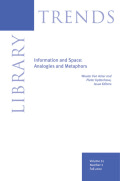
LIBRARY TRENDS
Empowering Researchers with Cutting-Edge InsightsLIBRARY TRENDS is a leading academic journal published by Johns Hopkins University Press, dedicated to the field of Library and Information Sciences. With an established history spanning from 1980 to 2023, this peer-reviewed journal provides a platform for insightful research, innovative practices, and critical analysis addressing contemporary issues in library science. While it holds a respectable Q3 quartile ranking within its category, it ranks #145 out of 280 in Scopus, indicating its significance in the academic community. With an impact factor that reflects the growing importance of the field, LIBRARY TRENDS invites contributions that encompass a wide range of topics, including digital libraries, information technology, and user studies. Although it is not an open-access journal, the content it provides is invaluable for researchers, professionals, and students seeking to enhance their understanding and improve their practices in the rapidly evolving landscape of library and information science. Discover more by exploring the latest issues and join the vibrant discourse shaping our information ecosystems.
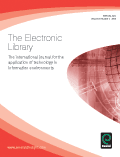
ELECTRONIC LIBRARY
Advancing Research in Electronic Resource ManagementELECTRONIC LIBRARY, published by EMERALD GROUP PUBLISHING LTD, serves as a pivotal resource in the realms of Library and Information Sciences as well as Computer Science Applications. Established in 1983 and continuing through 2024, this journal showcases critical research and developments that shape modern information practices and the utilization of electronic resources. With a respectable impact factor positioning it in the Q2 quartile for Library and Information Sciences and Q3 for Computer Science Applications, the journal ranks #57 out of 280 in its field, reflecting its significance within the scholarly community. Authors are encouraged to contribute innovative studies that engage with current challenges and technological advancements, ensuring that the ELECTRONIC LIBRARY remains at the forefront of academic discourse. While the journal does not currently offer open access options, it remains an essential subscription-based resource for researchers, professionals, and students seeking to deepen their understanding of digital libraries and information management.
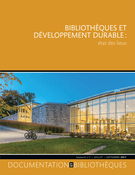
Documentation et Bibliotheques
Innovating the landscape of information science.Documentation et Bibliothèques is a pivotal academic journal published by the Association pour l'Avancement des Sciences et Techniques de la Documentation, based in Montreal, Canada. Focusing on the fields of library science and documentation, this journal serves as a crucial platform for disseminating research and practical insights that drive innovation in information management and library services. Although it does not follow an open access model, it boasts a dedicated readership among researchers, professionals, and students who seek high-quality content in the realm of information science. With its commitment to advancing theoretical and empirical studies, Documentation et Bibliothèques remains an essential resource for navigating the evolving landscape of documentation and library services. For those interested in exploring how strategic documentation practices can enhance knowledge dissemination, this journal provides a wealth of valuable resources and scholarly articles.

Annals of Library and Information Studies
Fostering Dialogue in Library ScienceAnnals of Library and Information Studies is a prominent open-access journal, published by NATL INST SCIENCE COMMUNICATION-NISCAIR in India, dedicated to advancing research in the fields of library science and information studies. With an ISSN of 0972-5423 and an E-ISSN of 0975-2404, this journal ensures broad accessibility, having embraced open access since 2009, facilitating the dissemination of knowledge to a diverse global audience. The journal features a comprehensive range of scholarly articles that explore innovative practices, emerging technologies, and significant trends influencing library and information science, which are crucial for professionals, researchers, and students alike. Additionally, it holds a respectable ranking in Scopus, positioned at the 54th percentile in Library and Information Sciences and 22nd percentile in Computer Science Applications, underscoring its relevance and impact within these disciplines. The Converged Years of 2011 to 2024 illustrate a commitment to publishing contemporary research. As the realm of information continues to evolve rapidly, the Annals of Library and Information Studies serves as an essential platform for fostering dialogue and knowledge exchange, solidifying its role as a vital resource for the academic community.
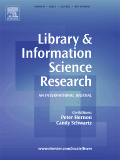
LIBRARY & INFORMATION SCIENCE RESEARCH
Exploring the future of information management.LIBRARY & INFORMATION SCIENCE RESEARCH is a premier academic journal dedicated to advancing the field of library and information sciences. Published by Elsevier Science Inc, this journal has established its reputation for rigorous research and impactful scholarship since its inception in 1987. With an impressive Q1 ranking in Library and Information Sciences and a Q2 ranking in Information Systems for 2023, it reflects the growing importance of library sciences in an increasingly digital world. The journal serves as an essential platform for researchers, professionals, and students, offering insightful articles that address emerging trends and challenges in the realm of information dissemination and management. Although not an open-access journal, its contributions are widely recognized, as evidenced by its strong Scopus rankings, with a position of #53 out of 280 in Library and Information Sciences. If you are looking to deepen your understanding of the dynamic interplay between libraries, technology, and information systems, LIBRARY & INFORMATION SCIENCE RESEARCH is an indispensable resource in your academic journey.

LIBRARY AND INFORMATION SCIENCE
Enriching understanding in the realm of library science.LIBRARY AND INFORMATION SCIENCE is a specialized academic journal dedicated to the advancement of knowledge and scholarship in the field of library and information sciences. Published by MITA SOC LIBRARY INFORMATION SCIENCE, this esteemed journal has been a crucial platform for scholarly communication since 1980, addressing the dynamic challenges and developments in the information landscape. Although it holds a Q4 category ranking in the Library and Information Sciences according to the 2023 Scopus Ranking, the journal serves a unique niche, providing insights and fostering discussions among a diverse audience of researchers, professionals, and students. With no Open Access options currently available, its valuable research contributions are accessible through institutional subscriptions and library access. The journal aims to disseminate innovative research, case studies, and theoretical explorations that enhance our understanding of information behavior, retrieval systems, library management, and emerging technologies, thus promoting an informed society in an increasingly digital world. Given its focused scope and enduring presence, LIBRARY AND INFORMATION SCIENCE continues to be an essential resource for anyone invested in the future of libraries and information services.

South African Journal of Libraries and Information Science
Exploring contemporary issues in library science.South African Journal of Libraries and Information Science, published by FORUM PRESS, is a premier open-access journal dedicated to advancing knowledge and research in the realms of library science and information management. Since its inception, this journal has been pivotal in promoting scholarly discourse amongst librarians, information professionals, and researchers within South Africa and beyond. With its open-access model implemented in 2011, it provides an invaluable platform for the dissemination of research findings, encouraging accessibility and collaboration within the field. The journal features a diverse range of articles that explore contemporary issues, innovations, and best practices in libraries and information science, making it essential reading for those seeking to stay at the forefront of this dynamic discipline. By fostering open dialogue and knowledge sharing, the South African Journal of Libraries and Information Science plays a critical role in shaping the future of library and information science education and practice.
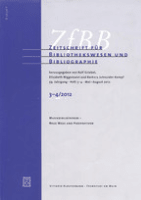
ZEITSCHRIFT FUR BIBLIOTHEKSWESEN UND BIBLIOGRAPHIE
Shaping the Future of Library Sciences through Scholarly InsightZEITSCHRIFT FUR BIBLIOTHEKSWESEN UND BIBLIOGRAPHIE is a distinguished academic journal dedicated to the fields of library science and bibliography, published by Vittorio Klostermann GmbH in Germany. With a historical foundation dating back to 1969 and a focus on contemporary research and practices in library and information sciences, this journal serves as a vital resource for scholars, practitioners, and students alike. Although it currently operates under a traditional subscription model, it remains an important platform for the dissemination of scholarly work, boasting insights into critical developments within the field. The journal's Scopus rank places it in the challenging Q4 category, reflecting its commitment to advancing knowledge in a competitive landscape. Published regularly, the journal invites contributions that discuss theoretical innovations, practical approaches, and empirical research, fostering collaboration and knowledge exchange among professionals in library management, information retrieval, and archival studies. By continuing to explore relevant topics, ZEITSCHRIFT FUR BIBLIOTHEKSWESEN UND BIBLIOGRAPHIE remains pivotal in shaping the future discourse in library and information sciences.